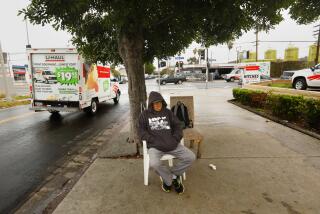Find Tranquility at Their Country Dachas on Weekends : Warsaw Residents Flee Madding Crowd
- Share via
RYNIA, Poland — It is dacha season in Poland, and Ewa Lukasiak is where you will find her on most weekend days for the next two or three months--digging in the garden behind the small country house that she built for herself about six years ago.
“You have to be careful of the roots,” she tells her neighbor, who watches skeptically as Lukasiak’s muddy fingers carefully separate the clods of dirt surrounding the new lettuce plants. As usual, she has over-planted the lettuce bed; it will all become ripe at once, so it is just as well to give some of it away now.
“Just make a little hole--like this--and set the roots down in it and push the soil up close.”
The neighbor’s dacha is 500 yards away. And further along the compact valley, rimmed by forests of pine and birch, are a dozen other dachas, all recently built, on land bought from a local farmer whose children have gone to the city and whose property now seems too big for one 60-year-old man to cultivate and care for alone.
The dachas were built mostly by Warsaw residents, and most of the two- or three-room houses took two seasons or more to build. Refinements are still going on, and the sounds of hammer blows can be heard carrying across meadow and forest. But the dominant noise here is the wind in the pine trees and the calls of birds.
Journey to Older World
This is dacha- land, far from urban concrete and the screech of city trams. Though it is less than 60 miles from the capital, where the less fortunate search out secluded spots in weedy parks to sunbathe, the trip to Rynia is like a journey back to an older world--as, indeed, most of rural Poland is.
On Sunday mornings, the little Fiats from the city, loaded with children, picnic things stacked in the back windows, turn off the main highways onto narrower roads through towns such as Michalow, Pustelnik and Stanislawow, where the residents are strolling to church along the sides of the roads. The little towns are still and clean, and all the businesses are closed.
Between the towns, the fields of rye are waist-high, blue-green in the morning sunlight. Every mile or two a family of farmers--grandmother, mom and dad and a few children--head toward church in heavy, horse-drawn wagons, the kids facing backward to watch as the cars from the city rush up behind and then whiz past, racing to their country leisure. These same drivers will make the return trip with far less urgency.
The farmland around Rynia is sandy and mostly given over to rye and hay. Wheat has never grown well here, and corn is seen only in small patches. The farmland is interspersed amid large tracts of pine forests, where, when fall comes, the weekenders will wander, gathering mushrooms in straw baskets.
Residents around here say that farms in the district--if not all of Poland--are in bad shape, as young people no longer seem interested in staying on the land. Farming has never paid very well, and the promise of a better life beckons rural youth to the cities.
For those already in the cities, of course, the countryside calls out just as forcefully, not as a source of livelihood, but of tranquility. And so, a farmer such as Czeslaw Majewski, whose three daughters all married city boys, happily sold off a dozen plots of land, an acre or two each, in the long meadow between the forests where Ewa Lukasiak built her dacha and tends her weekend garden.
All of this, as in many endeavors in Poland, is not quite official, the houses having been built without the required permits, which can take up to three years to secure. But there are thousands of similar dachas , and similar “unofficial” arrangements, all over Poland.
Farmers out here sell land with a price pegged to the price of sugar--one square meter equaling the price of two kilograms of sugar (which roughly equals $1 per square yard)--a ratio that has remained constant over the last several years. It is an arrangement that seems to have left everyone happy.
Majewski has made friends with most of the people who bought land from him. He mows their yards--his former meadow--and takes the cut grass for fodder. On weekends they visit him and his wife, Halina, and buy fresh milk and cream and eggs to take back to the city.
Rustic Machinery
The Majewskis sit on their porch, overlooking a barn lot whose stone buildings and rustic iron machinery look as though they came from the last century, and joke amiably with their urban visitors.
Majewski sometimes says he will one day sell all his land in return for a state pension and an apartment in town. But this is hard to imagine, somehow, for Majewski, with his pale farmer’s forehead and ruddy cheeks, standing slightly bow-legged in his rubber boots, seems as firmly fixed to the land as the stone foundation of his barn.
Sunday evening the dachas are shuttered and traffic winds back to the city, the picnickers sunburned, the dacha owners fingering fresh blisters from hammer or hoe. The traffic moves slowly now, and in the back windows are baskets of booty from the country--eggs from the farmer and jugs of fresh cream--prizes that, alone, would have made the trip worthwhile.
More to Read
Sign up for The Wild
We’ll help you find the best places to hike, bike and run, as well as the perfect silent spots for meditation and yoga.
You may occasionally receive promotional content from the Los Angeles Times.






